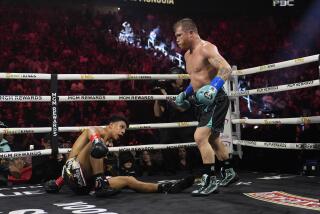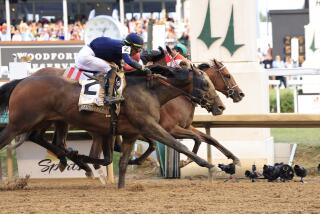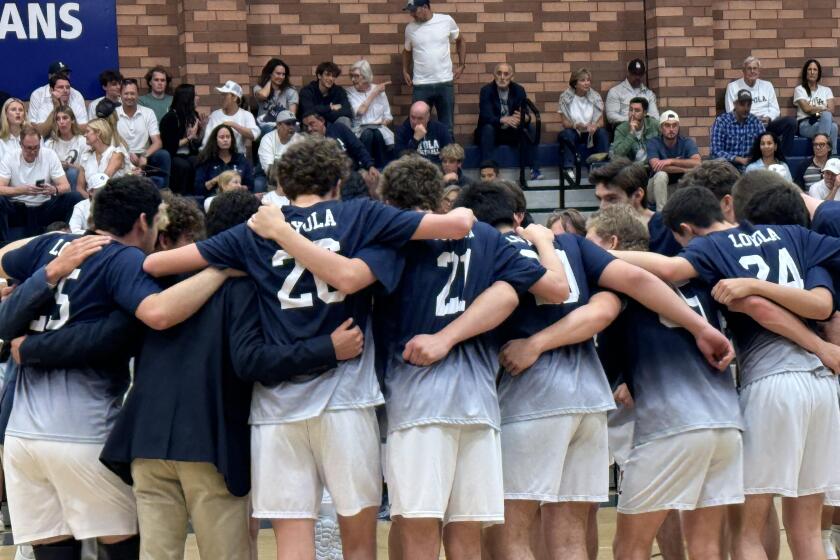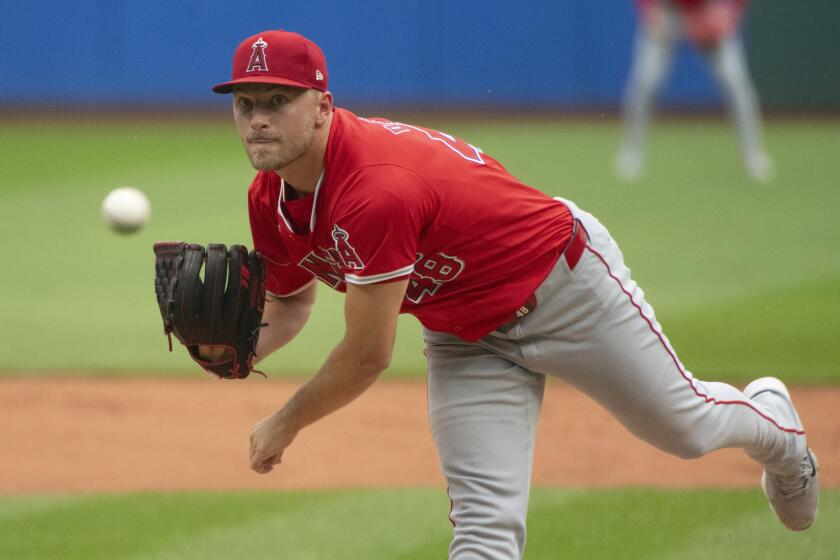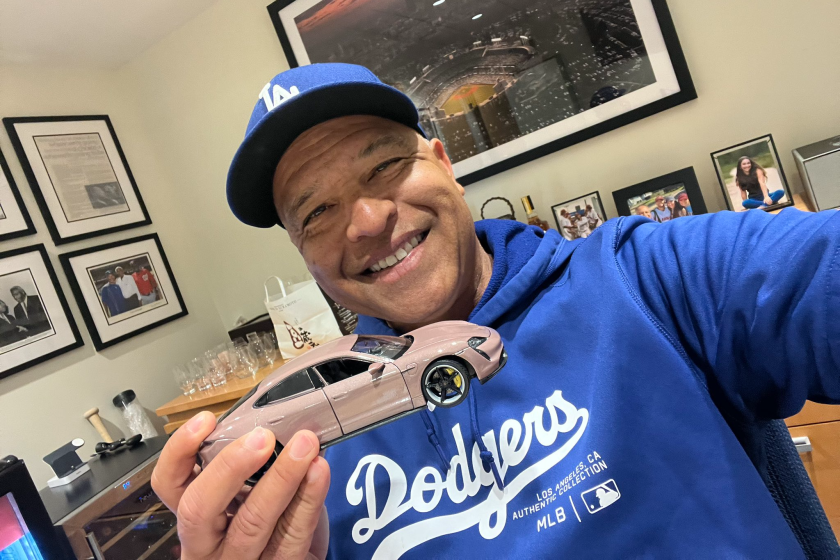Firing Away at the ABA
Fueled by memories of the American Basketball Assn. and its long-ago stars Julius Erving and Moses Malone, investor Duane Hughes happily paid $10,000 a year ago to buy a franchise in the revived league.
Hughes, a former New York City rapper, secured a 10,000-seat arena for his ABA team, the Charlotte Krunk. He booked rap artist Mike Jones for postgame entertainment. He paid for jerseys, basketballs and $30,000 worth of TV commercials. When referees refused to be paid by check, Hughes paid them in cash.
But like many investors in the ABA, Hughes’ experience ended in disaster.
He pumped $80,000 of his own money into the Charlotte Krunk last season to participate in a league some billed as a promising investment.
By December, the Krunk was $200,000 in the red and Hughes folded the team, as dozens of other ABA franchises -- crippled by dwindling bank accounts and inexperienced ownership -- crumbled around him. “Everyone was bleeding,” Hughes said, “including us.”
Since 2000, when the ABA resumed play, more than 50 teams have folded operations, including at least six teams in Southern California, leaving behind a steady trail of scorned owners.
Interviews with about 20 former ABA owners, players and executives, as well as e-mails and legal documents show a league with little executive control. The ABA has no centralized record-keeping to track statistics, such as scoring averages, rebounds and assists. That chore, mandatory for all teams, was regularly ignored when teams couldn’t afford stat-keeping software.
Last season, only seven of the 32 ABA teams finished their full 32-game schedule. Some teams, such as the Inglewood Cobras and Las Vegas Rattlers, played fewer than five games before folding.
Despite the league’s requirement that teams play in venues with 3,000 seats or more, ABA clubs routinely book high school gymnasiums, play for fewer than 100 people each night and field rosters of players more suited for an after-school pick-up game than a professional contest.
The SoCal Legends, owned by former Clippers point guard Gary Grant, played extra games against the L.A. Aftershock last season after the Legends canceled six home games when opposing teams never showed up. Grant said the league offered to repay him for those lost home dates. “I haven’t seen a dime yet,” he said.
The Legends made it to the ABA finals last spring, but Grant has only bitter memories of his first season. He insists the ABA owes him $30,000 in revenue-sharing from the playoffs.
Overall, Grant says he personally lost $400,000 in his first year with the ABA. Fed up with all the problems, Grant’s Legends and four other ABA teams defected this week to the 60-year-old Continental Basketball Assn. In the last three months, three vice presidents of the ABA have quit, unhappy with the league’s prospects.
Still, the ABA continues to operate, insisting to fans, owners and players that the league is blossoming. More than 60 teams are scheduled to play next season. Meanwhile, it relies on a revolving door of new owners to keep it afloat.
“There are only so many times that can happen” before the league loses all credibility, Hughes said. “I’d hate that because it’s destroying the name of the original ABA.”
Much of the criticism is directed at Joe Newman, the ABA’s chief executive. Newman, 69, worked for advertising agencies and in public relations in Indianapolis. He also worked in public relations with the Indiana Pacers in the original ABA.
That ABA, made famous from 1967 to 1976 by three-point shots, a red, white and blue ball and above-the-rim action, merged with the NBA and brought with it four teams -- the New York Nets (later New Jersey), Indiana Pacers, Denver Nuggets and San Antonio Spurs.
The league came to life again in 1999 when four businessmen, including Newman, founded the current ABA. It began play the next year. Newman now runs the league from an office in his basement.
When Newman became chief executive in 2004, the league underwent a massive growth spurt. He began selling ABA franchises for as little as $1, later charging $10,000 to $20,000 for a team. What began as a seven-team league ballooned to a 30-team association, with franchises in Mexico and Canada.
“I know I’ll have some bad owners.... I allowed them to come in and take a chance,” Newman said. “Initially, some of these owners [didn’t] know how to separate business from the game. Now, as they’re maturing, that’s less of a problem.”
Newman contends at least 15 ABA teams are well-run; others say that only one or two didn’t lose money last season.
His goal is to have 100 ABA teams competing in every nook of North America.
“Teams are getting killed on travel” expenses, Newman said. By adding more teams that are geographically close, teams can save money by taking “ground transportation” to away games, he said.
But past and present ABA officials, investors and players tell stories of general mismanagement and empty promises -- deals with ESPN and Wal-Mart -- that never materialized. Newman talks of an initial public stock offering in August, although the league has no solid revenue stream. By Newman’s own reckoning, the ABA lost $60,000 in the playoffs last spring.
“If one team leaves, [Newman] will get two new ones, just like he told me when I left” to join the CBA, said Grant.
Meanwhile, the ABA struggles in the most basic organizational issues. When some teams dropped from its division, the Gallup Talons in New Mexico scheduled their own pick-up games to finish the season.
When the Florida Pit Bulls played host to last year’s All-Star game, they were left with a hefty bill and were later promised reimbursement from the league that has never materialized.
Last season, when the coach of the local Carson Buzz pushed a referee during a regular-season game, there was no punishment. After an apologetic news release and a letter to the league, he coached the next night.
When a Krunk player tore an Achilles’ tendon during a game, the league-endorsed insurance plan didn’t cover the injury, Hughes said. So he paid the medical bill from his own pocket.
One complaint by critics is that the ABA prays on those with shallow pockets and extravagant dreams, with minimal knowledge of pro sports, and so winds up with too many weak owners who lack an adequate bankroll.
“People can buy a franchise with their credit card,” said Florida Pit Bulls owner Demetrius Ford. His team also defected to the CBA.
The ABA name is licensed by the NBA. When the NBA, which owns all the rights to the ABA, caught wind of the start-up league in 2000, it sued for trademark infringement. To settle the suit, the ABA paid $100,000 for use of the league’s name and the red, white and blue ball made famous by the original ABA.
The NBA can void the contract and take the ABA name away if it deems the league is in violation of the agreement. By taking a year off to “reorganize” in 2002, the ABA broke a clause in its contract requiring continuous play during a 12-month span, according to the licensing agreement obtained by The Times. But the league paid the NBA $25,000 for an extension.
The NBA issued a statement about the struggling league: “As we do with all licensees, we communicate directly, not publicly, with the ABA on any issues relating to its license agreement.”
Former owners think that Newman, and the ABA, will continue to attract new investors drawn by its famous name.
“I went all out because this was the ABA,” Hughes said, “or what I felt was a possible reincarnation.
“They take no liability for anything,” he said of the ABA. “That’s the problem. These teams come in and nobody is held accountable.”
More to Read
Get our high school sports newsletter
Prep Rally is devoted to the SoCal high school sports experience, bringing you scores, stories and a behind-the-scenes look at what makes prep sports so popular.
You may occasionally receive promotional content from the Los Angeles Times.
